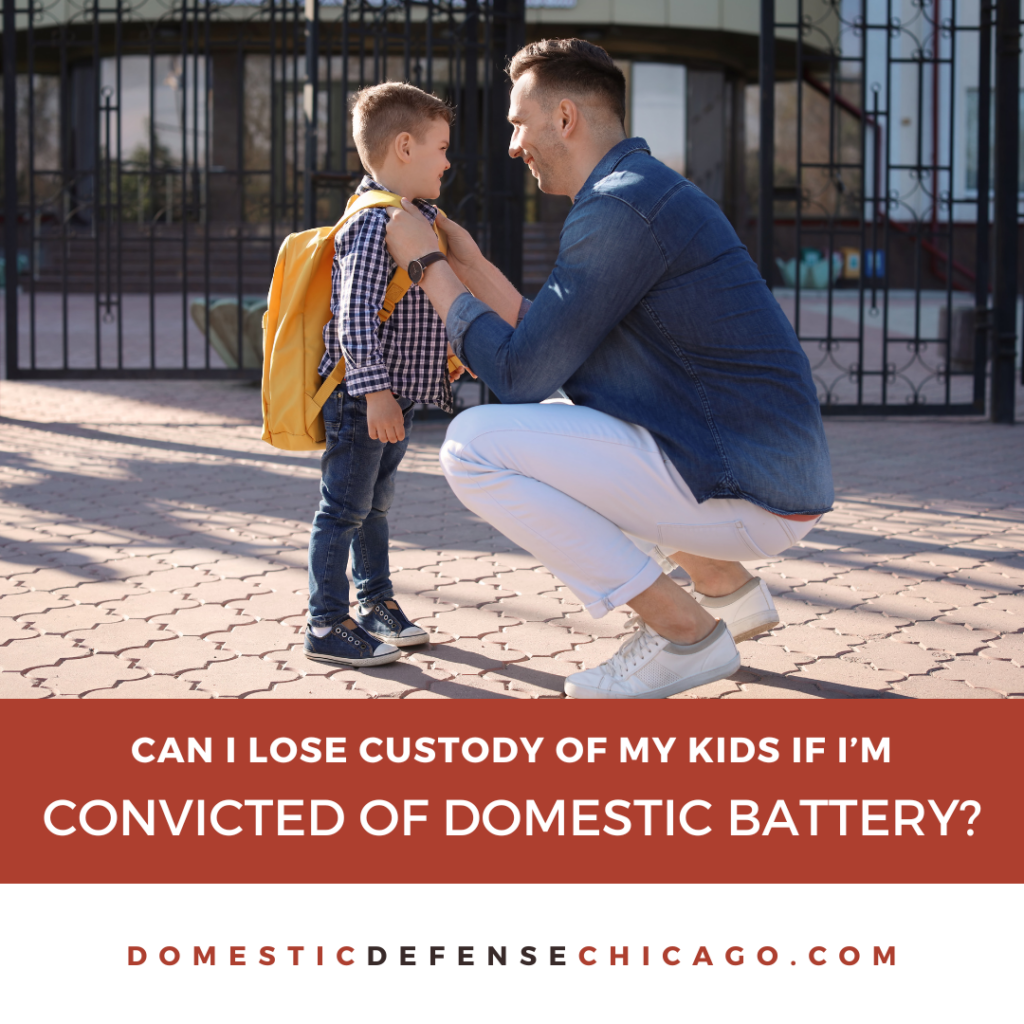When you’re facing domestic battery charges in Illinois, the fear of losing custody of your children can be overwhelming. If you’re in this situation, it’s essential to understand the potential consequences and the importance of experienced legal representation. This guide will provide you with an understanding of the legal landscape and offer insights into how a conviction could affect your parental rights.
Can I Lose Custody of My Kids if I’m Convicted of Domestic Battery?
This guide explains the following:
- What domestic battery entails under Illinois law
- The potential consequences of a conviction
- How custody considerations play into domestic battery cases
- The role of a defense lawyer in your case
- Defense strategies that could be employed
Here’s a closer look at each.
What Domestic Battery Entails Under Illinois Law
Under Illinois law, domestic battery is a criminal offense that occurs when an individual knowingly causes bodily harm or makes physical contact of an insulting or provoking nature with a family or household member. This definition encompasses a range of behaviors and does not necessarily require visible injuries. The law aims to protect individuals from violence within domestic settings, and as such, the charges are taken very seriously by the legal system.
The Potential Consequences of a Conviction
The consequences of a domestic battery conviction in Illinois can be severe and long-lasting. Depending on the circumstances, such as prior convictions or the severity of the alleged incident, charges can escalate from a Class A misdemeanor to a Class 4 felony or higher. Penalties may include imprisonment, hefty fines, and completion of domestic violence programs. Beyond legal repercussions, a conviction can tarnish your reputation, impact employment opportunities, and restrict your rights, including firearm ownership and parental privileges.
How Custody Considerations Play Into Domestic Battery Cases
In child custody matters, Illinois courts focus on the best interests of the child, which includes ensuring their safety and welfare. A domestic battery charge can significantly impact custody considerations, as the court may view an individual convicted of such an offense as a potential threat to the child’s well-being. This can result in limited visitation rights or loss of custody. In some cases, supervised visitation may be ordered to protect the child while maintaining parental contact.
The Role of a Defense Lawyer in Your Case
A defense lawyer plays a pivotal role in navigating the complexities of a domestic battery case. They provide legal counsel, represent your interests in court, and work to ensure that your rights are upheld throughout the legal process. An attorney with experience in domestic battery cases will understand the nuances of Illinois law and will be able to craft a defense strategy tailored to the specifics of your situation. Their advocacy is essential in seeking a favorable outcome, whether that’s a case dismissal, acquittal, or reduced charges.
Defense Strategies That Could Be Employed
Defense strategies in domestic battery cases vary widely based on the individual circumstances. A lawyer may challenge the prosecution’s evidence, arguing that it is insufficient or flawed. They might also question the credibility of witnesses or suggest that the incident was an accident or self-defense. In some cases, demonstrating a lack of intent to cause harm or provocation can be effective. Each strategy requires a thorough investigation and a strong legal argument, which an experienced defense attorney will be able to provide.
FAQ About Domestic Battery and Child Custody
Check out these commonly asked questions about domestic battery and child custody. If you don’t see the answers here, please call our office and we’ll get you the information you need.
What Is Considered Domestic Battery in Illinois?
In Illinois, domestic battery is defined as intentionally causing bodily harm to any family or household member or making physical contact of an insulting or provoking nature with them. This includes not just spouses and children, but also anyone related by blood or marriage, people who share or have shared a home, and individuals who have a child in common, among others. The law takes a broad view of what constitutes family or household members to ensure comprehensive protection.
Can Allegations of Domestic Battery Affect My Divorce Proceedings?
Allegations of domestic battery can have a profound effect on divorce proceedings in Illinois. The court may view these allegations seriously, especially when determining child custody arrangements. If the court believes that a child’s safety might be at risk, it could limit or deny custody or visitation rights to the accused parent. Additionally, these allegations could influence the division of assets and spousal support decisions, as they may contribute to the court’s understanding of the marital relationship’s dynamics.
What Should I Do If I’m Falsely Accused of Domestic Battery?
Being falsely accused of domestic battery is a situation that requires a strategic and measured response. The first step is to refrain from confronting the accuser, as this could exacerbate the situation. Instead, contact a lawyer who specializes in domestic battery cases to begin building your defense. It’s important to collect any evidence that may corroborate your version of events, such as text messages, emails, or witness statements. Your lawyer will advise you on the best course of action and how to proceed without incriminating yourself further.
How Can a Lawyer Help Me If I’m Charged With Domestic Battery?
A lawyer can provide invaluable assistance if you’re charged with domestic battery. They’ll review the charges against you, advise you on your legal rights, and develop a defense strategy tailored to your specific situation. This may involve negotiating plea bargains, challenging the prosecution’s evidence, and representing you in court. A lawyer’s goal is to achieve the best possible outcome, whether that’s a dismissal of charges, an acquittal, or reduced penalties.
What Happens to My Child Custody If I’m Convicted of Domestic Battery?
If you’re convicted of domestic battery, the implications for child custody can be severe. Illinois courts prioritize the child’s best interests, which typically means ensuring their safety and well-being. A conviction can lead to the court imposing restrictions on your custody and visitation rights, up to and including the complete loss of custody. In some cases, the court may allow supervised visitation to maintain the parent-child relationship while still protecting the child. Your lawyer will work to demonstrate your positive attributes as a parent and argue for your continued involvement in your child’s life, within the parameters set by the court.
Remember, if you’re facing domestic battery charges, it’s not too late to seek legal help. An experienced lawyer can make a significant difference in the outcome of your case and the future of your family.
Do You Need to Talk to an Attorney About Domestic Battery Defense?
If you need to talk to a domestic battery defense attorney in Illinois, we’re here to help. Call us at 847-920-4540 now – we’ll be happy to give you a free consultation and talk to you about your options.







Leave A Comment
You must be logged in to post a comment.